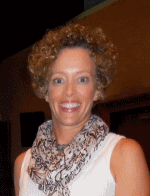AUCD's Virtual Trainee, Jody Pirtle, Assisted in the Development of a Medical Home for Children with Special Health Care Needs and their Families
April 30, 2012

|
| 2011-2012 Virtual Trainee, Jody Pirtle |
Just do SOMETHING...
Jody M. Pirtle
Arizona LEND Trainee
In the small, rural Southern Arizona border town where I live, I've had the privilege of working with a local community health center over the past three years to create a medical home for children with special health care needs (CSHCN) and their families. I consider our medical home program a support group for children with Autism Spectrum Disorders (ASD) and their families. A critical component of the medical home is support for and involvement of the families of CSHCN. We knew that in our community, one of the largest barriers to families coming to a support group was childcare. So, we provided childcare for the families, creating a kind of support system for families of children with ASD.
This support system began when a rather distraught mother of a child with ASD indicated to her care coordinator at the medical home that she did not know any other families with ASD. When the care coordinator asked, the mother's face lit up at the thought of meeting other families to whom she could relate. The care coordinator and I brainstormed what we could do and we decided that instead of continuing to talk about the what, why, and how we could do something, we'd take that step forward and create an opportunity for families to gather and share stories.
During the summer of 2011, we formed two informal back-to-back groups-one Spanish and one English speaking-with the care coordinator facilitating the adult section of the groups and me facilitating the childcare. Each group consistently met every other week for the entire summer and ranged in size from 4 to 6 family participants and 4 to 8 children with ASD and their siblings. The feedback we received was very positive; families indicated the groups were effective-they were able to share diagnosis stories, treatment and intervention options, success stories, challenges, and coping mechanisms. As the parent's group evolved, we let them guide the discussion, with the care coordinator there to help facilitate introductions and initiate conversations. Her role quickly became one of guiding the simple (and loose) meeting structure. At each gathering, we provided the families with general information and resources regarding ASD, and family participants initiated the exchange of their own contact information. I had the great fortune of being responsible for the children during the meetings-luckily I had a great advantage: as a former special education teacher in the local school district, I knew many of the children that came to the group. We provided a variety of gross and fine motor, art, and sensory activities for the children.
Unfortunately, the groups were suspended in the fall of 2011 due to lack of staffing and scheduling issues with the children in school. We were excited that the support groups were reinstated in March 2012 as a collaborative effort between the community health center, the Division of Developmental Disabilities (DDD), and two Behavioral Health agencies in the community. The new group that gathered in March of 2012 consisted of approximately 25 families of children with ASD. At this new collaborative meeting, the intent was to determine the direction of future support groups. Many stories where shared, but the majority of the time was spent soliciting feedback from the families.
Looking to the future, support groups will be held monthly and locations will rotate among the facilities of the collaborating agencies. We will continue to have both Spanish and English groups and will provide childcare.
I am thrilled we decided to 'just do something' last summer! Even though we had to pause the groups for a short while, through the cooperative efforts within the community, it appears our support groups will be stronger and more effective than we ever imagined. One of my favorite quotes by FDR seems appropriate-"Do Something. If it works, do more of it. If it doesn't, do something else." I encourage you to get out there and do something to support families of children with ASD.
If you'd like more details about our adventure in supporting families of children with ASD, please feel free to contact me anytime at [email protected]







